Why this resume works
- Quantifies accomplishments: The applicant’s measurable accomplishments, such as reducing deploy time by 40% and downtime by 20%, reflect significant cost-saving measures and operational efficiency.
- Highlights industry-specific skills: The applicant’s expertise in AWS solutions and CI/CD pipeline optimization highlights industry-specific skills important for roles requiring cloud computing and continuous integration.
- Illustrates problem-solving ability: Implementing monitoring tools to cut downtime showcases their problem-solving skills, revealing a talent for strategic innovation and initiative under pressure.
More DevOps Engineer Resume Examples
Our DevOps engineer resume examples show how to showcase your automation skills, collaborative experience, and system management expertise. Use these computer software resume samples to build a resume that highlights your strengths in DevOps roles.
Entry-Level DevOps Engineer
Why this resume works
- Effective use of keywords: By weaving in keywords like “AWS Solutions Architect” and “CI/CD workflows,” the applicant ensures their resume is optimized for applicant tracking systems (ATS).
- Centers on academic background: Featuring degrees from prestigious institutions like MIT and Stanford, the applicant’s education section shows strong academic foundations important for early career advancement.
- Shows digital literacy: Listing tools such as Docker and Kubernetes illustrates the applicant’s computer skills and readiness to tackle modern workplace challenges.
Mid-Level DevOps Engineer
Why this resume works
- Points to measurable outcomes: By delivering measurable results like reducing deployment time by 30% and improving system resilience, the applicant showcases a strong focus on impactful contributions and operational efficiency.
- Includes a mix of soft and hard skills: The mix of technical expertise in CI/CD pipelines and interpersonal skills is evident, emphasizing teamwork alongside automation and optimization capabilities for well-rounded professional effectiveness.
- Demonstrates language abilities: Listing language skills in Spanish, French, and Japanese demonstrates the applicant’s ability to support global collaboration and cross-cultural communication in technical environments.
Experienced DevOps Engineer
Why this resume works
- Lists relevant certifications: By listing certifications such as AWS DevOps Engineer, the applicant showcases dedication to expertise and continuous learning.
- Showcases impressive accomplishments: Delivering major infrastructure projects on time highlights significant business impact and senior-level performance.
- Emphasizes leadership skills: Managing AWS infrastructure cost efficiency and leading initiatives like CI/CD deployment reduction exemplifies robust leadership skills.
DevOps Engineer Resume Template (Text Version)
Chris Zhang
Jacksonville, FL 32208
(555)555-5555
Chris.Zhang@example.com
Professional Summary
Experienced DevOps Engineer skilled in cloud solutions, automation, and CI/CD. Proven track record in optimizing performance and reducing costs. Seeking to leverage expertise in systems engineering at TechWave Solutions.
Work History
DevOps Engineer
TechWave Solutions – Jacksonville, FL
January 2023 – June 2025
- Optimized CI/CD pipelines to reduce deploy time by 40%
- Implemented monitoring tools, reducing downtime by 20%
- Automated infrastructure provisioning with Terraform
Systems Engineer
CyberNetics Corp – Miami, FL
January 2020 – December 2022
- Designed scalable AWS solutions saving K per year
- Set up automatic failover systems increasing uptime by 30%
- Integrated security protocols reducing risk by 25%
Infrastructure Engineer
GlobalTech Inc – Tampa, FL
January 2018 – December 2019
- Managed VMware environments increasing efficiency by 15%
- Led network upgrades reducing latency by 20%
- Configured backup solutions securing data integrity
Skills
- Continuous Integration
- Infrastructure Automation
- Cloud Computing
- Configuration Management
- Monitoring and Alerting
- Security Protocols
- Version Control Systems
- Performance Optimization
Education
Master’s Computer Science
Stanford University Stanford, CA
June 2017
Bachelor’s Information Technology
University of Washington Seattle, WA
June 2014
Certifications
- AWS Certified Solutions Architect – Amazon Web Services
- Certified Kubernetes Administrator – Cloud Native Computing Foundation
- DevOps Foundation Certification – DevOps Institute
Languages
- Spanish – Beginner (A1)
- Mandarin – Beginner (A1)
- German – Beginner (A1)
Related Resume Guides
Advice for Writing Your DevOps Engineer Resume
Explore tips on how to write a resume for a DevOps engineer role. Learn how to highlight your tech skills, collaborative spirit, and knack for bridging development and operations seamlessly.
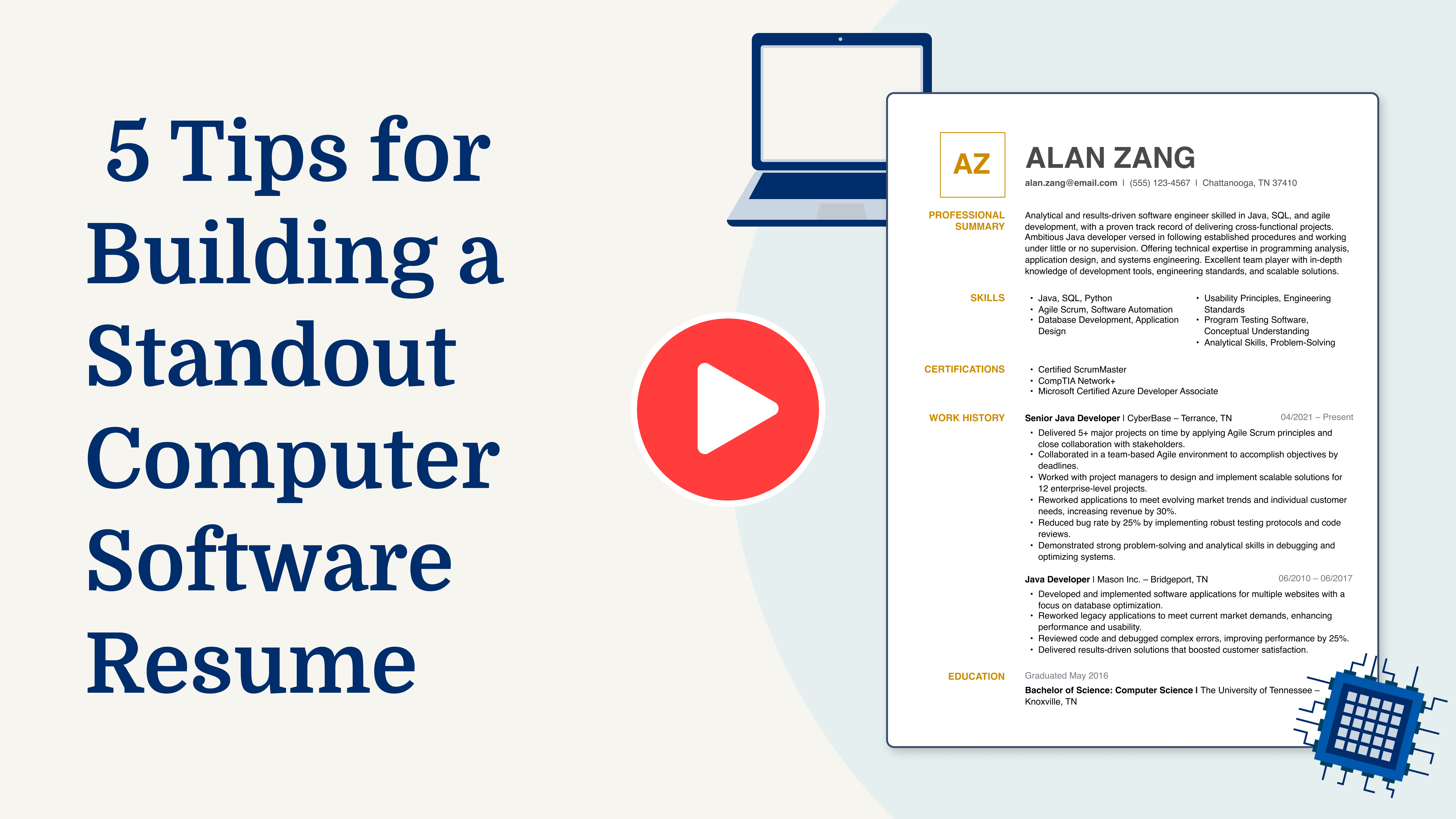
Highlight relevant technical skills
For a DevOps engineer, technical skills are key to success. These skills show your ability to handle the tools and processes needed for the job. Some important technical skills for a DevOps engineer include knowledge of cloud platforms like AWS or Azure, experience with containerization tools such as Docker, and familiarity with orchestration platforms like Kubernetes.
Skills in scripting languages like Python or Bash are also helpful. Understanding version control systems like Git is essential, too. Adding these skills will show hiring managers that you have the technical know-how they seek.
Create a skills section in your resume to make it easy for employers to see what you can do. You can also weave these skills into your work experience section to show how you’ve used them in real-world situations. Remember, being clear and direct about your skills helps employers quickly understand what you bring to the table.
Whether you list them separately or within your job descriptions, ensure they relate directly to tasks you’ve handled before. This approach makes your resume stronger and more relevant to the DevOps engineer role you’re aiming for.
Example of a technical skills section
- Continuous integration and continuous deployment (CI/CD) tools (Jenkins, GitLab CI, Travis CI)
- Containerization technologies (Docker, Kubernetes)
- Cloud platforms (AWS, Azure, Google Cloud Platform)
- Configuration management tools (Ansible, Puppet, Chef)
- Monitoring and logging solutions (Prometheus, Grafana, ELK Stack)
- Version control systems (Git, SVN)
- Infrastructure as code (Terraform)
- Scripting languages (Python, Bash)
You can use our Resume Builder to create a standout resume that highlights relevant technical skills and soft skills for DevOps engineer roles.
Quantify your accomplishments
Quantifying accomplishments on your resume makes it more compelling than simply listing job responsibilities. For a DevOps engineer, it’s important to show the impact of your work with measurable results.
Instead of just saying you managed deployments, mention that you reduced deployment time by 50% or cut server downtime by 30%. This approach helps hiring managers quickly assess your skills and contributions.
In the work experience section, each entry should include your job title, employer name, location, and employment dates. To make these entries stand out, turn duties into achievements by incorporating metrics like percentages, time savings, cost reductions, or efficiency improvements.
Using action verbs alongside these numbers creates a results-driven resume that highlights what you’ve accomplished rather than just what you’ve done.
Quantified accomplishments help hiring managers see the real impact of your work. If you saved costs or improved efficiency in your role as a DevOps engineer, stating those figures directly shows the value you bring.
This method not only showcases your skills but also demonstrates your ability to deliver tangible results, making your resume more appealing and easier for employers to evaluate quickly.
5 DevOps engineer work history bullet points
- Automated deployment pipelines for 50+ applications, reducing release times by 40%.
- Implemented monitoring systems, decreasing incident response time by 25% and improving system reliability.
- Migrated legacy infrastructure to cloud platforms, resulting in a 30% reduction in operational costs.
- Collaborated with cross-functional teams to integrate CI/CD practices, accelerating software delivery cycles by 35%.
- Led the development of an infrastructure-as-code framework that improved scalability and reduced manual configurations by 60%.
Get ideas for your resume by checking out professional resume examples. They show you how to make your skills and experience stand out.
Write a powerful professional summary
A professional summary on a resume introduces hiring managers to your career highlights and sets the tone for the rest of your resume. When crafting your resume, you’ll need to decide between writing a summary or a resume objective, depending on your experience level.
A professional summary is typically three to four sentences long, highlighting your experience, skills, and achievements. It’s best suited for experienced applicants who want to showcase their professional identity and value quickly. The goal is to provide a snapshot of what you bring to the table in terms of expertise and accomplishments.
In contrast, a resume objective is about your career goals. It’s ideal for entry-level applicants, those changing careers, or individuals with employment gaps. While summaries focus on “what I’ve accomplished,” objectives emphasize “what I aim to contribute.”
Next, we’ll provide examples of both summaries and objectives tailored for different industries and experience levels, including specific insights for roles like DevOps engineer.
DevOps engineer resume summary examples
Entry-level
Recent computer science graduate with a focus on cloud computing and infrastructure automation. Completed AWS Certified Solutions Architect – Associate and Microsoft Azure Fundamentals certifications. Skilled in scripting with Python and Bash, familiar with CI/CD pipelines, and eager to contribute to innovative DevOps projects.
Mid-career
DevOps engineer with over five years of experience specializing in continuous integration and deployment across multiple platforms. Proven track record in managing AWS services, improving system performance, and collaborating with development teams to streamline operations. Recognized for implementing scalable solutions that reduce deployment time by 30%.
Experienced
Seasoned DevOps engineer and team leader with expertise in cloud architecture, container orchestration using Kubernetes, and microservices deployments. Over 10 years of experience driving organization-wide adoption of best practices in DevOps culture. Known for reducing operational costs through automated solution delivery and optimizing resource utilization by 40%.
DevOps engineer resume objective examples
Entry-level
Driven recent computer science graduate eager to launch a career as a DevOps engineer. Equipped with foundational skills in cloud computing, scripting, and continuous integration practices. Passionate about optimizing software development processes and ensuring seamless deployment pipelines in agile environments.
Career changer
Resourceful IT support specialist transitioning into a DevOps role, bringing hands-on experience with troubleshooting and system administration. Aspires to leverage technical expertise and problem-solving skills in building automated solutions that improve development efficiency and operational stability.
Entry-level
Aspiring DevOps engineer with a background in software development projects during academic studies. Familiar with containerization technologies and eager to contribute to collaborative teams by implementing innovative solutions that streamline application delivery and improve infrastructure reliability.
Opt for a resume template that has clear sections and simple fonts, avoiding excessive colors or graphics, so your skills and work history are noticeable to employers.
Showcase your credentials
Listing your credentials is key when you’re aiming to be a DevOps engineer. Certifications, licenses, and specialized training show your skills and knowledge in this technical field. They help you stand out because they prove you’ve learned specific tools and techniques.
Creating a certifications section on your resume lets employers see these achievements easily. This can go along with your education details to give a full picture of what you know. Here are a few examples of certifications to include on your resume:
- AWS Certified DevOps Engineer – Professional
- Microsoft Certified: DevOps Engineer Expert
- Google Professional DevOps Engineer
- Certified Kubernetes Administrator (CKA)
- HashiCorp Certified: Terraform Associate
- Docker Certified Associate (DCA)
- Red Hat Certified Engineer (RHCE)
Having the right certifications can make a big difference in getting hired as a DevOps engineer. They show that you have up-to-date skills that are needed for the job. By highlighting these on your resume, you increase your chances of landing interviews and jobs.
Example of a certifications section
AWS Certified DevOps Engineer – Professional
Issued by: Amazon Web Services (AWS)
Expires 2025
Docker Certified Associate (DCA)
Issued by: Docker, Inc.
Issued 2022
Certified Kubernetes Administrator (CKA)
Issued by: Cloud Native Computing Foundation (CNCF)
Expires 2024
Google Cloud Professional DevOps Engineer
Issued by: Google Cloud
Issued 2023
Red Hat Certified Specialist in Ansible Automation
Issued by: Red Hat
Expires 2026
Choose a polished resume format that showcases your skills and qualifications effectively to stand out to hiring managers.
FAQ
Do I need to include a cover letter with my DevOps engineer resume?
Yes, including a cover letter with your DevOps engineer resume can improve your application by highlighting your unique skills and experiences. A cover letter gives you the chance to explain why you’re drawn to the specific company and role, something that isn’t always clear in a resume.
You can dive deeper into your experience with tools like Docker, Kubernetes, or AWS and how you’ve used these to drive efficiencies and improvements. Consider mentioning any projects that showcase your ability to bridge development and operations teams effectively.
Use resources such as online templates or cover letter examples specifically tailored for tech roles, and use our Cover Letter Generator to craft a compelling cover letter.
How long should a DevOps engineer’s resume be?
For a DevOps engineer, aim for a concise one-page resume that highlights key skills like automation, cloud services, and CI/CD expertise.
If you have over 10 years of experience or several relevant certifications, stretching to a two-page resume is acceptable.
Ensure every detail is relevant to the role, showcasing your ability to streamline operations and improve system reliability. Focus on recent impactful projects to keep the reader engaged.
If you’re unsure about the ideal length based on your career stage, explore our guide on how long a resume should be for more tailored insights.
How do you write a DevOps engineer resume with no experience?
To create a DevOps engineer resume without direct experience, emphasize your skills, education, and projects that demonstrate your potential in the field. Here are a few tips to help you get started:
- Emphasize technical skills: List programming languages, tools, and technologies you’re familiar with, such as AWS, Docker, Jenkins, or Kubernetes. Highlight any self-taught skills or certifications from platforms like AWS Certified Cloud Practitioner.
- Showcase relevant projects: If you’ve worked on personal or academic projects involving automation scripts, cloud deployments, or version control systems like Git, detail these experiences. Explain your role and the impact of your contributions.
- Highlight educational background: Include any degrees in computer science or related fields. Mention coursework that aligns with DevOps principles, such as the software development lifecycle and network management.
- Leverage transferable skills: If you have experience in IT support or software development roles, emphasize skills such as problem-solving, collaboration in team settings, and understanding of software processes.
You can find helpful tips on crafting a resume with no experience to guide you through the process.
Rate this article
Devops Engineer
Additional Resources
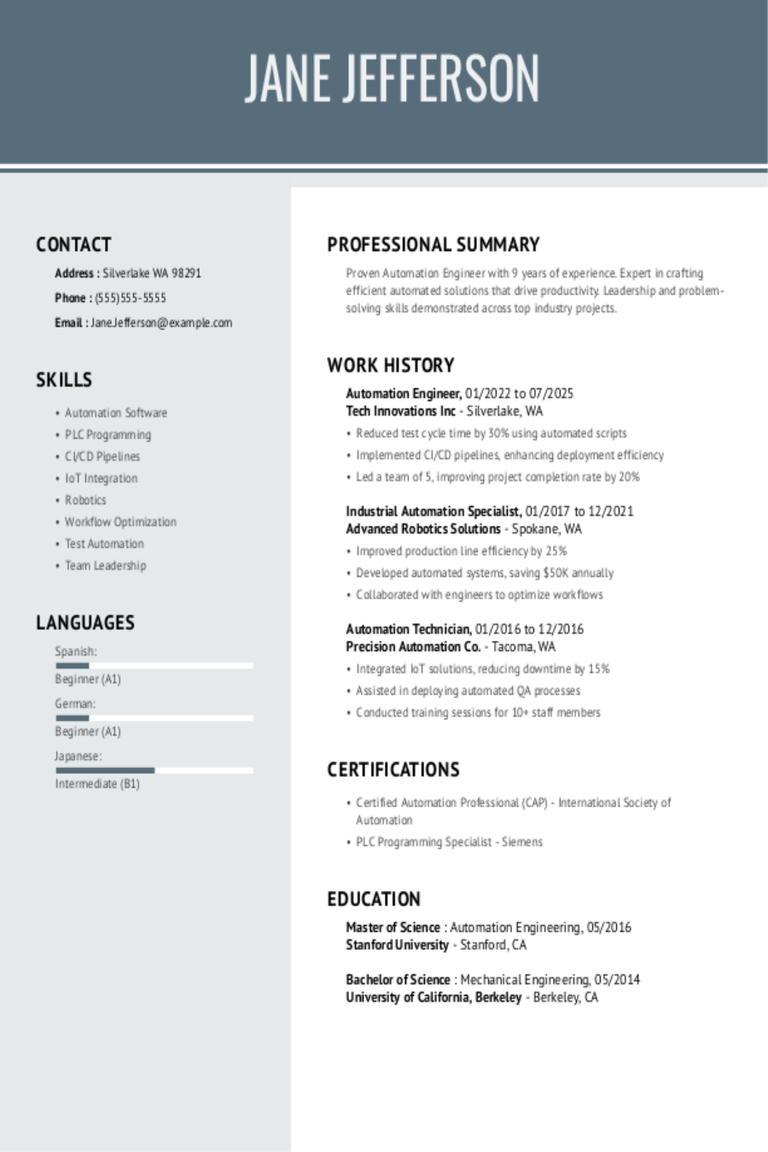
Automation Engineer Resume Examples & Templates for 2025
Automation engineers play a vital part in modern industries and businesses. They aim to enhance efficiency by designing, developing and implementing systems that automate different tasks and processes. Explore our guide
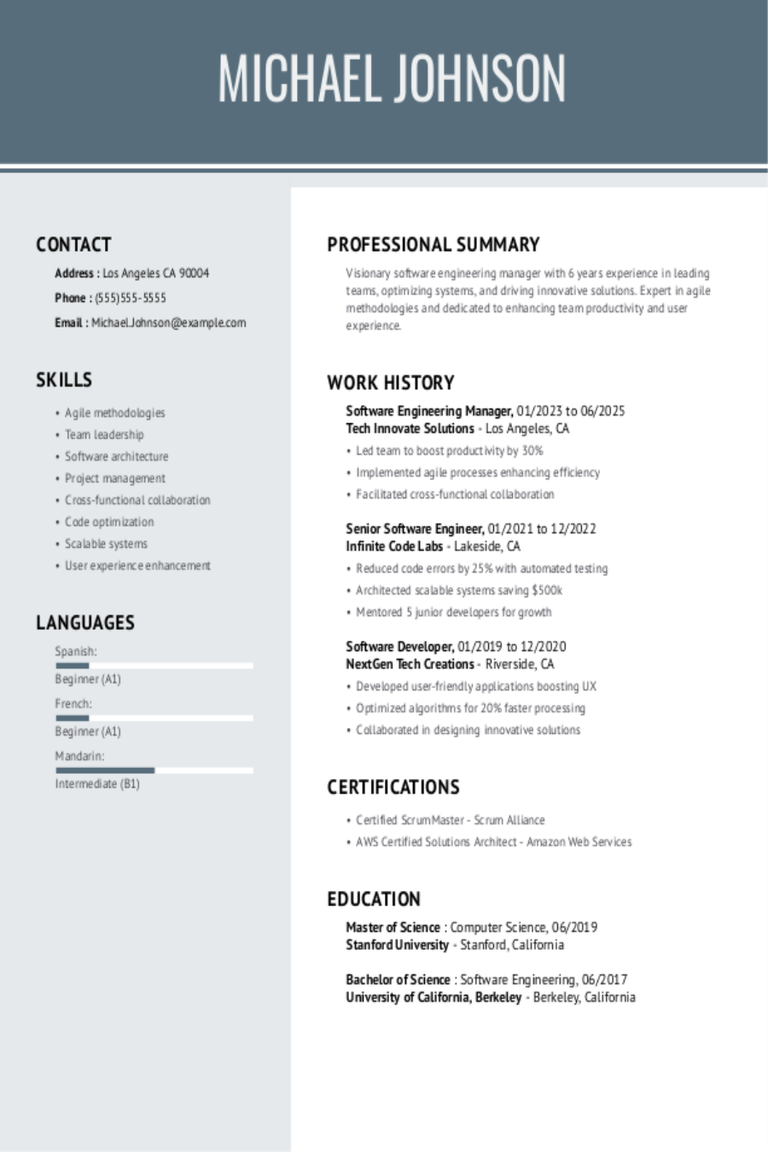
Software Engineering Manager Resume Examples & Templates for 2025
A great job as a software engineering manager demands a perfect software engineering manager resume and we are here to help you create one. Our guide to crafting a perfect
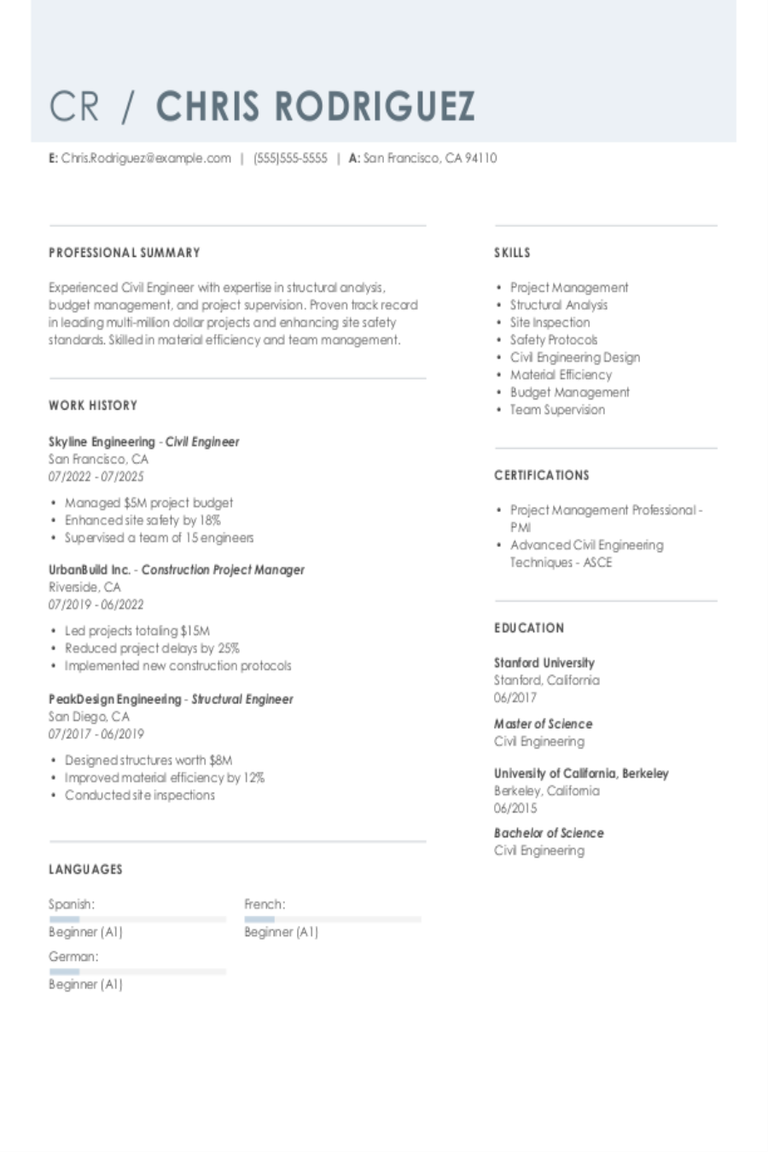
Civil Engineer Resume Examples & Templates for 2025
Entry-level
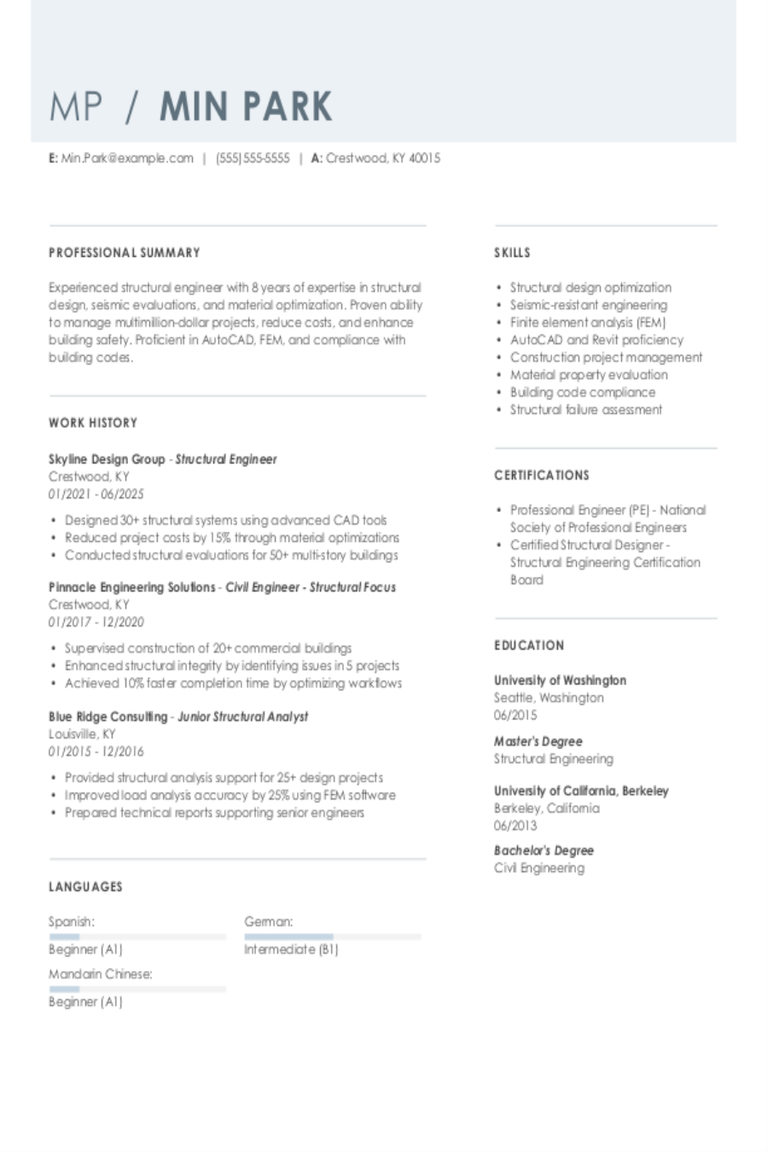
Structural Engineer Resume Examples & Templates for 2025
Being a structural engineer is an exciting job that involves designing and constructing buildings and other structures. Structural engineers must have a strong understanding of engineering principles, mathematics and physics,
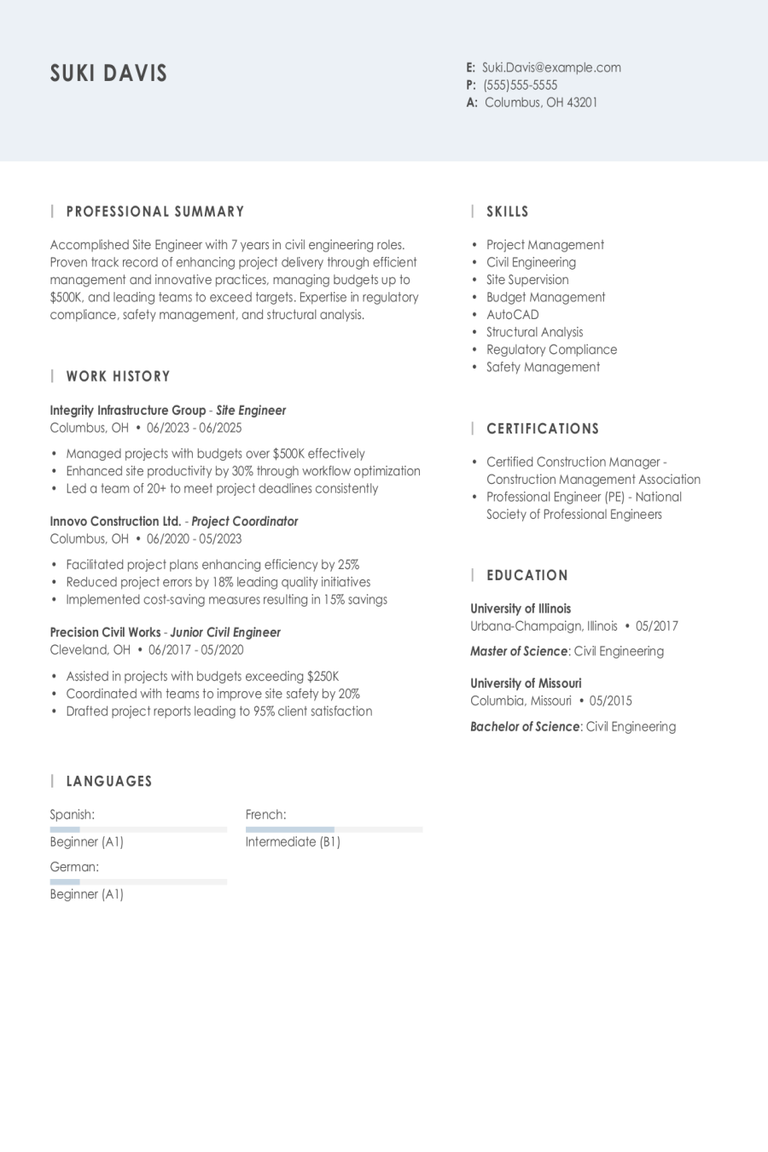
Site Engineer Resume Examples & Templates for 2025
Seeking a job as a site engineer? A well-written Resume is a great place to start, and we’re here to help! This guide to writing an effective site engineer Resume
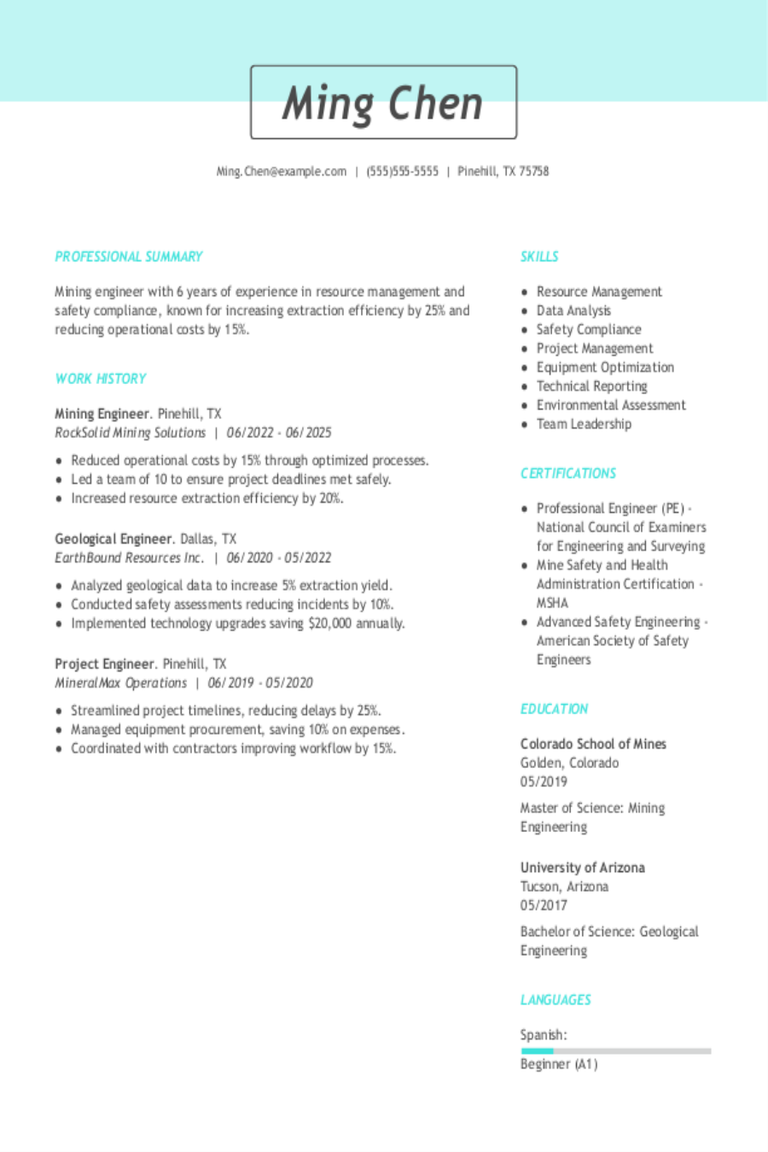
Mining Engineer Resume Examples & Templates for 2025
A great job as a mining engineer demands a perfect mining engineer resume. Not sure what that looks like? Don’t worry! We’re here to help you create one. Our guide
